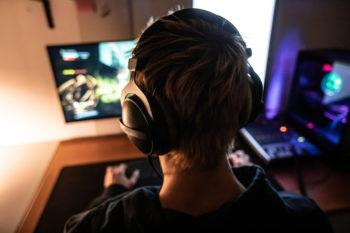Could Online Gaming Social Networks Have A Positive Impact On Mental Health?
Researchers from Texas A&M’s School of Public Health analyzed communications and social support on an online gaming site.

For millions of Americans, playing some type of video game is a daily occurrence. Games can be a welcome form of entertainment and relaxation for many, and the internet can even make gaming a social activity. However, excessive video game playing to the point of isolation, addiction or changes in mood or behavior are growing concerns with this pastime. These possible negative effects may also contribute to anxiety and depression in some people and gaming may have varying effects on social connections.
A new study published in Sociological Focus builds on existing research hinting at the importance of social connectivity and support for online gamers. In this study, Dr. Tyler Prochnow and Dr. Meg Patterson of the Department of Health Behavior at the Texas A&M University School of Public Health, along with colleagues from the University of North Carolina and Baylor University, used social network analysis to examine the social structure of an online gaming site at two points in time. The goal of this analysis was to see how social support, sense of community and symptoms of depression affect social connections over time.

The research team analyzed a social network consisting of members of an online football simulation gaming site, surveying members at the beginning and end of the game’s season. In the game, players play as the head coach of a football team and compete against other members of the site over 10 months. Members are able to communicate directly with each other through the site’s forums, chat and direct messaging capabilities.
“We wanted to showcase the community building and informal relationships built through these online settings,” Prochnow said. “Many people feel a sense of community, support and comfort through online gaming, and I think we need to do a better job measuring these connections and fostering them to improve mental health in today’s digital age.”
There were 37 members who responded to the survey at the beginning and 40 who responded at the end, with 30 members represented in both samples. The researchers collected data on age, sex and other demographic factors as well as the number of hours members spent on the gaming site and playing other video games. Members also answered survey items on depressive symptoms and perceived ability to talk to someone about problems. The researchers also asked members to list people in real life and on the gaming site that they talked to about important life matters.
Research has found correlations between social network strength and depression, with stronger social networks giving people more opportunities to find support. Informal social networks, such as those found in online gaming, could play a crucial role in coping with stressors and seeking formal help for anxiety or depression. This, combined with research finding that people turn to social networks for help in times of trouble, add to the relevance of this study.

The study found that social support, sense of community and depressive symptoms played a role in changes to the game’s social structure over time. The researchers observed that people who reported more social support online, and those who reported less real-life support, were more likely to reach out to other members. They also found that communication ties were more likely to form when communications were reciprocated or transitive (involving three people groups or clusters). In addition, players who spent more time on the site were more likely to have communication ties.
The researchers also found that members who reported feeling a greater sense of community and placing value in being a part of the site were more likely to form communication ties over time. In addition to being more likely to connect, these members might feel more comfortable with conversations about real life issues. This points to the importance of a sense of community in online gaming sites; however, online communities can carry some downsides such as the potential for sites to serve as political and ideological echo chambers.
The study noted that although members with less real-life support were more likely to form communication ties, those reporting greater depressive symptoms were less likely to send communication ties over time. This could indicate a need for more formal support for members experiencing depressive symptoms, including telehealth mental health care options.
This study’s findings reinforce existing research on connections between mental health, social support and online gaming and point to the need for more research into the complicated relationships in these areas. More research into these areas and their interactions could help inform interventions to improve social connection and mental health for socially isolated communities and populations living in socially isolating times such as the early stages of the COVID-19 pandemic
Publication: Tyler Prochnow, et al., Online Gaming Network Communication Dynamics, Depressive Symptoms, and Social Support: A Longitudinal Network Analysis, Sociological Focus (2023). DOI: 10.1080/00380237.2023.2199171
Original Story Source: Texas A&M University

 Alerts Sign-up
Alerts Sign-up